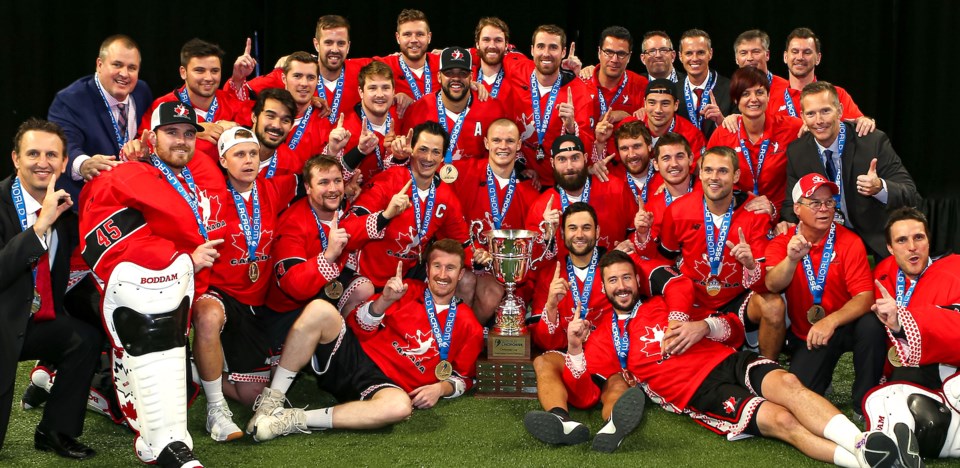Playing on home soil, with the expectations of victory every game comes with its fair share of challenges.
But Canada persevered as they demonstrated a dominance at a whole new level in capturing the Cockerton Cup on Saturday night at Langley Events Centre, defeating the Iroquois Nationals 19-12 in the gold-medal game at the 2019 World Lacrosse Men’s Indoor World Championship.
Canada trailed just twice (and both times by only a single goal) before they seized control in the second quarter, turning a 6-5 lead into a 10-6 advantage at the half. From there, Canada never looked back, shutting the door on the Iroquois Nationals to win the Men’s Indoor World Championship for a fifth consecutive time.
All five victories at the quadrennial event have come at the expense of the Iroquois Nationals, and for a fifth straight time, it was the United States again winning bronze as the Americans defeated England 11-8 in the third-place match which preceded the gold-medal game.
Just how dominant was Canada at the event? In six games – four during the round-robin and then the semifinal and final – the team outscored the opposition 110-44 with an average margin of victory of 11 goals per game.
Over 360 minutes of lacrosse, Canada trailed just five times for a grand total of 9:28. And they were tied for just 22:36 of game action.
But they did all this with the weight of being expected to win, especially with the Championship being contested at home.
“There is a lot of pressure representing Canada and the success that they have had,” admitted Canadian head coach Glenn Clark.
“Relief is the best description, and excitement, obviously,” he said when asked to describe the feeling of accomplishing what everyone fully expected them to do. “It is a long week, you put a lot into it and there is a lot of pressure representing Canada and the success the have had.”
“The expectations were big, especially playing on home soil, especially myself, growing up 10 minutes down the road,” said Port Coquitlam’s Curtis Dickson. “This is my third gold medal on the world stage, but it is extra special to be able to do it in my own backyard.”
Dickson scored five goals in the gold-medal game along with two assists.
“Honestly this is a really talented team and great coaching that taught us to stick to our guns and make sure we got better every game and I think the systems were in place for us to succeed and the players showed up in the big moments,” said Canadian defender Matt Beers.
Players and coaching staff alike relished the fact they were able to celebrate the championship at home with friends and family in attendance.
“It is a great feeling winning it on home soil and obviously you have a lot of family members here to share it with. And the truth and the reality is, these are the people who have supported you to get to this place, so it means a lot to have that opportunity,” Clark said.
In Saturday’s championship final, Dane Dobbie led all scorers with 10 points, including three goals, with Robert Church (four goals, one assist), Mark Matthews (one goals, five assists), Dhane Smith (three goals, one assist), Chris Corbeill two goals, one assist) and Ben McIntosh (tone goal, two assists) rounded out Canada’s scoring.
The Iroquois Nationals were led by five goals and six points from Zed Williams while Randy Staats and Cody Jamieson had a goal and three assists apiece. Tehoka Nanticoke (three goals), Lyle Thompson (one goal, two assists) and Kyle Jackson (one goal, one assist) completed their team’s scoring.
Jamieson was named the Most Valuable Player. He scored 11 goals and 28 points in four round-robin games and added another three goals and 10 points in two playoff games.
Staats and Matthews were named as the forwards to the All-World Team. Transition player Joel White (United States) and Canadian defenders Graeme Hossack and Kyle Rubisch as well as goaltender Mike Poulin rounded out the team.
The President’s team (the all-star team for the non-Blue Division teams) consisted of forwards Robert Raittila (Finland) and Matthew Taylor (Australia), transition player Adrian Balasch (Austria), David Beckmann (Germany) and Markus Mattila (Finland) on defence and Germany’s Craig Wende (goaltender).
Following each team’s final game, one player or staff member was selected as a recipient for their team’s Spirit of Lacrosse Award.
The winners were: Bob Carter (Australia), Rintaro Fujita (Austria), Sean Ferris (Canada), Walter and Flavia Rojas (Costa Rica), Roman Pokorny (Czech Republic), Andy Downing (England), Pentti Pekkonen (Finland), Scott S. Stapleford (Germany), So Ka Ho Godwin (Hong Kong), Jeff Dowling (Ireland), Gewas Schindler (Iroquois Nationals), Andrew Alderman (Israel), Alejandor Trias (Mexico), Arttu Sesselaar (Netherlands), Dylan Cowman (Scotland), Uros Matijasevic (Serbia), Tomas Rydlo (Slovakia), Curt Kinney (Sweden), Marion van Jackowski (Switzerland), Jim Starkey (United States) and Brent McCauley (Officials).



